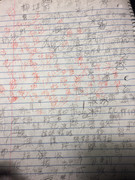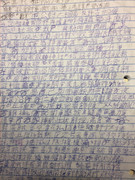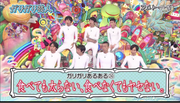
UPDATE to this ENTRY
My HG format is multiple clozes with huge intervals!
** Click here for my anki settings that I use with this card format
word or word in a sentence, definition in japanese/korean/english, screenshot WITHOUT text

This is my anki card for GGADDAK
Back of the card
answer to cloze, more definitions from wordquery, screenshot from Korean show.

Front for card 2 of the same note. It only has the ttk blanked out with the {{c2:}} code

*-{{c1::까}}{{c2::딱}}-*하면
*-{{c1::ひょ}}-*っとすると、や*-{{c1::や}}-*もすれば、ともすれば
まかり間違えば、危うく、しきりにうなずくように、こくりこくり
well what I see is black and white since I use an ereader but it’s legible nonetheless.
HS RAPPER (spoiler below)
………….
………….
………….
………….
………….
………….
………….
………….
………….
………….
………….
………….
………….
………….
HIGH SCHOOL RAPPER
t I didn’t want young b to win high school rapper for the sole reason that I liked his song the least out of everyone who performed in the finals. I acknowledge that he’s great at rapping but I was confused as to how he got the most votes. Maybe it was different seeing the performance in person or maybe his popularity/fame from show me the money had a bearing on the results. I knew for the longest time he won this show because they mentioned it a million times on show me the money so when he finished performing on the HS finale I thought that’s it??? since he was the last to perform and the ante had been getting upped time and time again.
+++++ end of spoiler
………….
………….
………….
………….
………….
………….
………….
………….
another example:
FRONT: ++++++++++

the Korean definition was generated by hanseido. I don’t obsesses and waste time trying to go 1000% monolingual dic especially for korean ( I love what steve kauffman says in his youtube vids about the issue.)
On an unrelated note I learned why for certain korean/japanese words it’s so much easier just to learn the english word…. it was because the word was ORIGINALLY IN ENGLISH and it was translated to Japanese and then the korean people just took the words that japanese people painstakingly translated and brought the words into korean by reading the words with their hanja readings . I found about it from a japanese book I was reading last month which talked about how Japan was obsessed with learning from other countries in the 1800s?? 1700s?? in the various advanced fields like science and so they had to translate all that shit from other languages to Japanese and of course they came across words that don’t exist in Japanese so they had to invent them using the kanji that they have. So that is why with some words it’s easier to use English because it was the original word (but then again they translated from many languages…. not just english. there were so many countries with booming culture and sciences back in the day) and the 1 word is so much easier to remember than an explanation/essay. ).
I set up anki so that Hanseido look-ups come to the front of the card since I won’t even read it let alone remember it if it’s in the back). I usually don’t put screenshots in the front because it’s too much work (for this one I just felt like it and I thought it would help me remember) and I will never put a screenshot with text on the front.
Back:+++++++++++++++

Edit field just to show the multiple cloze deletions I have going on here. sometimes I do c3 for the definition. it all depends on what I feel like doing.

the c2 card:

FIRSTLY, I find cloze deletion and anki great for upper intermediate/advanced and may even more upper intermediate (these terms all just broad… ). I don’t recommend it for beginners or intermediate. I think it’s self-evident whether or not this card format is viable at your current Korean level.
 I recently came up with a brilliant format and process for making anki cards for Korean while watching korean talk/variety shows. I’m sure it could be applicable to other languages too. I love cloze deletion cards and they are especially effective for me for Korean. This is in part due to my level, my vocabulary because I would think it’d be very taxing and painful to do cloze deletion cards as a beginner or intermediate even. If anything though I think you’re better off doing other things like actual reading/listening to build your vocab than making and reviewing srs cards if you’re a beginner (I think that using anki to learn the top 1000 words of a language to be really inefficient compared not using it especially if you have a lot of free time). I find it to be really helpful as an advanced korean learner. I hate the traditional sentence/plain word vocab card formats for Korean when using anki because to me it makes no sense to be testing yourself in anki the way you’re testing yourself whenever you watch any native material containing unknown words which is the majority of native material since you’re not gonna 100% of the words native speakers use in speech. Of course that was my go to format for Korean in the beginning! At the time, as far I knew it was either look up words and make anki cards when I watch the show or look up words and not make anki CArds (this will guarantee that you will end looking up the same word 5-10 times if not more). It was clear to me that I’d rather make anki cards than look up the same word 20 times in the dictionary (this made me inexplicably angry probably since I’m not as passionate about Korean as I am about Japanese and because half the words were sino-words). At the time of I didn’t even conceive the possibility of other ways of using anki ie other formats besides the usual flashcard format.
I recently came up with a brilliant format and process for making anki cards for Korean while watching korean talk/variety shows. I’m sure it could be applicable to other languages too. I love cloze deletion cards and they are especially effective for me for Korean. This is in part due to my level, my vocabulary because I would think it’d be very taxing and painful to do cloze deletion cards as a beginner or intermediate even. If anything though I think you’re better off doing other things like actual reading/listening to build your vocab than making and reviewing srs cards if you’re a beginner (I think that using anki to learn the top 1000 words of a language to be really inefficient compared not using it especially if you have a lot of free time). I find it to be really helpful as an advanced korean learner. I hate the traditional sentence/plain word vocab card formats for Korean when using anki because to me it makes no sense to be testing yourself in anki the way you’re testing yourself whenever you watch any native material containing unknown words which is the majority of native material since you’re not gonna 100% of the words native speakers use in speech. Of course that was my go to format for Korean in the beginning! At the time, as far I knew it was either look up words and make anki cards when I watch the show or look up words and not make anki CArds (this will guarantee that you will end looking up the same word 5-10 times if not more). It was clear to me that I’d rather make anki cards than look up the same word 20 times in the dictionary (this made me inexplicably angry probably since I’m not as passionate about Korean as I am about Japanese and because half the words were sino-words). At the time of I didn’t even conceive the possibility of other ways of using anki ie other formats besides the usual flashcard format.
ie:
Front: Word
Back : definition in english/japanese and maybe a screenshot of the sentence from a Korean tv show
Front: Sentence
Back: Japanese definition entry from naver j-k dictinoary of the word in the sentence that I don’t know (from lingoes) and maybe a screenshot of the sentence from a korean tv show
The way I see it is that the whole point of doing anki cards is so that when i add word x  to anki and do the reviews I expect myself to recognize it (and remember the meaning) or at least know that it’s in my deck when I see it in the wild again. By recognizing I mean instantaneous recognition so anything longer than 5 seconds is really BAD. If I add word x by itself on the front or the sentence containing word x on the front of a card with the answer on the back (the usual flashcard/anki format) I’m essentially putting myself in the same exact situation as when I initially come across unknown words on a tv show or novel or article etc. for example, I’ll watch a tv show, they’ll say something I don’t know and they also happened to have the text across the screen and I care enough so I look it up in lingoes or google or naver etc. What usually happens is if I find the correct definition everything is crystal clear and I understood it and I may or may not completely forget the word or definition or both 5 minutes/30 seconds later if I don’t use anki. For me, the traditional format is too much work and it’s not effective. What happens is I either I don’t engage with it properly so I’m not really doing the reviews or I do engage with it properly and do the painful thing where I force myself to conjure the definition out of thin air since the only clue is the word or sentence containing the word only to mark AGAIN a month later or just draw a blank go no f’in idea (the former with the thinking hard thing is especially awful and ineffective in my experience). When I half-ass it I either read the sentence or half-read it (reading it in a lazy way) or don’t read it (but don’t realize I’m not reading it) or only read it a little of it (not enough) and I usually press the SHOW answer after 0.5 seconds (barely enough time to actually engage/think about it but I am impulsive like that especially when I am not into it and maybe I grew irritated at this format over the years), read the answer go yeah that seems familiar but for some reason I can’t remember it at all (or it’s like the first time I’m reading it) and proceed to press hard ASAP (again barely enough to read it or I half-read it) until I feel like hitting AGAIN in some future session. So of course this didn’t happen with all my korean cards but it happened frequently enough to make me not give a shit and keep marking hard, then again depending on how I felt rather than if I actually knew the answer. I acknowledge that my disenchantment towards Anki played a role in rendering the traditional format ineffective for me. That was inevitable from having used anki all these years and having a lazy disposition. However, I recall that even when I did my reviews seriously (using the traditional format of sentence/word on the front and definition on the back) I could tell some of it was just not working and I was wasting my energy. Also, I felt that anki was less effective for Korean compared to Japanese when I made cards in the traditional format even taking into account the disparity between amount of time spent watching korean tv vs japanese tv (everyday while korean is like every few weeks, months etc). I think the the writing systems played a part in that.
to anki and do the reviews I expect myself to recognize it (and remember the meaning) or at least know that it’s in my deck when I see it in the wild again. By recognizing I mean instantaneous recognition so anything longer than 5 seconds is really BAD. If I add word x by itself on the front or the sentence containing word x on the front of a card with the answer on the back (the usual flashcard/anki format) I’m essentially putting myself in the same exact situation as when I initially come across unknown words on a tv show or novel or article etc. for example, I’ll watch a tv show, they’ll say something I don’t know and they also happened to have the text across the screen and I care enough so I look it up in lingoes or google or naver etc. What usually happens is if I find the correct definition everything is crystal clear and I understood it and I may or may not completely forget the word or definition or both 5 minutes/30 seconds later if I don’t use anki. For me, the traditional format is too much work and it’s not effective. What happens is I either I don’t engage with it properly so I’m not really doing the reviews or I do engage with it properly and do the painful thing where I force myself to conjure the definition out of thin air since the only clue is the word or sentence containing the word only to mark AGAIN a month later or just draw a blank go no f’in idea (the former with the thinking hard thing is especially awful and ineffective in my experience). When I half-ass it I either read the sentence or half-read it (reading it in a lazy way) or don’t read it (but don’t realize I’m not reading it) or only read it a little of it (not enough) and I usually press the SHOW answer after 0.5 seconds (barely enough time to actually engage/think about it but I am impulsive like that especially when I am not into it and maybe I grew irritated at this format over the years), read the answer go yeah that seems familiar but for some reason I can’t remember it at all (or it’s like the first time I’m reading it) and proceed to press hard ASAP (again barely enough to read it or I half-read it) until I feel like hitting AGAIN in some future session. So of course this didn’t happen with all my korean cards but it happened frequently enough to make me not give a shit and keep marking hard, then again depending on how I felt rather than if I actually knew the answer. I acknowledge that my disenchantment towards Anki played a role in rendering the traditional format ineffective for me. That was inevitable from having used anki all these years and having a lazy disposition. However, I recall that even when I did my reviews seriously (using the traditional format of sentence/word on the front and definition on the back) I could tell some of it was just not working and I was wasting my energy. Also, I felt that anki was less effective for Korean compared to Japanese when I made cards in the traditional format even taking into account the disparity between amount of time spent watching korean tv vs japanese tv (everyday while korean is like every few weeks, months etc). I think the the writing systems played a part in that.
 If I add word x to anki and I want to be able to recognize it/remember the meaning when it pops up in native media in the future, the best way to remember it using it anki is NOT testing myself in the exact way that I encountered the word minus the sound ( I never considered adding audio to my korean cards because I don’t need IT and it takes up time. I only record if I’m going to ask people “what did this person say” ) or putting a word I encountered on the front and the answer on the back. Doing either of those things makes no sense. It took me a long time to recognize this and do something about it unfortunately! One reason I don’t feel inclined to read the sentence in my deck is that it’s BORING! My disinclination quadruples when that sentence is written in hangeul vs. Japanese or English for good reason. I’ve tried bolding and underlining the word in the sentence to see if that would lower the burden and motivate me to read the anki card and it didn’t make much of a difference. It was because it did not change the fact that it’s boring to make myself to read a sentence. You’re subjecting yourself to the same experience minus the audio. I feel that much more unmotivated to read something I already read especially if it has an unknown word in it. Also reading sentences written in hangeul is very labor-intensive to me because I have points of comparison (READING Japanese versus Korean is like night and day or 月とスッポン in Japanese since Korean is a phonetic alphabet while Japanese uses kanji which represents sound and meaning. Also Japanese has katakana and hiragana which makes reading Japanese more learner-friendly since it let’s you know what’s up and makes parsing sentences less of a chore ).
If I add word x to anki and I want to be able to recognize it/remember the meaning when it pops up in native media in the future, the best way to remember it using it anki is NOT testing myself in the exact way that I encountered the word minus the sound ( I never considered adding audio to my korean cards because I don’t need IT and it takes up time. I only record if I’m going to ask people “what did this person say” ) or putting a word I encountered on the front and the answer on the back. Doing either of those things makes no sense. It took me a long time to recognize this and do something about it unfortunately! One reason I don’t feel inclined to read the sentence in my deck is that it’s BORING! My disinclination quadruples when that sentence is written in hangeul vs. Japanese or English for good reason. I’ve tried bolding and underlining the word in the sentence to see if that would lower the burden and motivate me to read the anki card and it didn’t make much of a difference. It was because it did not change the fact that it’s boring to make myself to read a sentence. You’re subjecting yourself to the same experience minus the audio. I feel that much more unmotivated to read something I already read especially if it has an unknown word in it. Also reading sentences written in hangeul is very labor-intensive to me because I have points of comparison (READING Japanese versus Korean is like night and day or 月とスッポン in Japanese since Korean is a phonetic alphabet while Japanese uses kanji which represents sound and meaning. Also Japanese has katakana and hiragana which makes reading Japanese more learner-friendly since it let’s you know what’s up and makes parsing sentences less of a chore ).
I’ve also made the observation that there are words/sentences in my deck in the basic format that I know I read at least 10x times in my anki deck, yet i still have no idea that the word/sentence is in my deck and don’t know the meaning of the “unknown” word the cards are testing me on either. I think it’s because I find the information extremely arbitrary due to all vowel/syllable/bacchim/etc combinations in Korean… It’d be probably 100x more arbitrary if I was illiterate in Japanese (=hanja literacy) and was completely oblivious to the hanja behind the hangeul. However this would never happen with the cloze deletion format. It’s just impossible since you’re presented a card with something blanked out. In the traditional format I am presented the word or sentence in its entirety so there are cards where regardless of how many times I’ve read it or seen it, I don’t remember the word and/or the meaning etc. The act of recalling information that is blanked out is more powerful than passively reading something over and over again over a long, extended period of time even if the interval is scheduled by anki. Also just seeing an anki card with something blanked out is inherently more memorable than seeing an anki word with nothing blanked out especially when you blank a part of a word rather than the whole word. Basic anki card formats are especially prone to failure with Korean since there are a myraid of vowel/consonant/bacchim combinations are possible. It creates a very big problem where I go why do I give a shit about this card/word. Making a cloze magically makes it into a card I care about. I’ve read in a book that you can remember stuff better if you practice recall which I agree with whole-heartedly and I find the cloze deletion format more conducive towards practicing recall than the basic sentence/word on the front. By reading I mean I listened to the audiobook at 1.5x or 1.25x BY USING one of my 4 library cards! Oh wait I have 5 since I have my internet korean library card. Also, here’s another book review with a summary of the points. And another
You have to practice SMART not HARD. Training and performing are completely different activities. Basketball players do other things besides play basketball to train and pianists don’t play the song over and over again from start to finish to practice (that’s what i did lol since i hate practicing!!!) . They do stuff in training that they don’t do during the performance because it’s effective. You could write out each of the regular usage kanji ( about 2000) a thousand times and still not be able to write all of them out off the top of your head (OF course I’m recommending RTK for this very reason) but I think in Korea they encourage nonsense like this last I heard because they love working hard (they should focus on working smart more). However in all seriousness learning 2000 hanja is not hard when you’re fluent in Korean provided you’re using effective methods that does not involve copying/writing each character and its meaning/readings a couple hundred times. You have to approach it in a strategic manner or you’re just wasting time. It’s great that you’re hard-working and you have all this energy and drive to reach your goal but if you’re going it about it in the wrong way it can be  ineffective and tortuous! It’s not always no pain, no gain. I knew it was more effective than the traditional formats for me but I couldn’t explain why until now.
ineffective and tortuous! It’s not always no pain, no gain. I knew it was more effective than the traditional formats for me but I couldn’t explain why until now.
Clozing multiple syllables of the word (I usually do the first 2 syllables of a word since most words are 2 syllables) makes korean anki cards more effective. When the word is long ie 3 or more syllables I usually choose 2 syllables to blank out. If the word is really bad I cloze more than 2 syllables. The only time I kill a whole word is if the word is one syllable and if it’s hard i give myself a hint with a letter from English alphabet like j for 지. I prefer the English alphabet to using hangeul for hints since English stands out among the sea of Korean and Japanese therefore takes less effort to notice/read. Erasing the whole word and trying to remember that is TOO MUCH WORK and I don’t think it’s worth it. I even put in hints for particularly challenging 2 syllable cloze cards during review if I can tell that I will never remember the word from having failed it a few times ( I can just tell!) . Coming up with the Korean syllable using the hint is challenging since there could be bacchim and Korean has a lot of vowel and consonant sounds. I don’t mark all cards I got wrong AGAIN. I mainly employ this strategy for the sake of conserving time and energy since my number of cards to relearn would double or triple if I were to truly answer AGAIN for anything I got wrong (this time and effort is not proportional to the benefits at all in my opinion. 99% of the time it doesn’t matter if mark the card AGAIN now or 5 days from now or 3 months from now ). I’m kinda balancing my load myself without the plugin insofar as failed cards are concerned. I have my step set to 2400 as it is so I don’t see failed cards until 2-3 days later (this is to help build my excitement and enthusiasm to read the failed cards). Also, if I’m close to the answer ie the bacchim is wrong or the vowel sound is wrong or the consonant sound is wrong I usually don’t mark AGAIN since it’s very much possible I could get it right the next time since I just got an exposure to the word or maybe I’ll read it or hear it somewhere in Korean media before the next review. Korean just has a lot of vowel and consonant sounds so it just so happens that sometimes I’m CLOSE but not correct. However there are times where I will mark the card wrong if I got it wrong because of bacchim because I felt compelled to see the card again sooner because remembering that particular word exactly is important to me. Taking a lax approach to failing cards allows me to focus on words/sentences that I truly want to learn. Furthermore, sometimes I can’t tell how useful/important the word is since what dictates that is Korean native material and I don’t watch Korean tv 10 hours a day everyday let alone everyday etc (I can try to guess or make assumptions based on the meaning of the word for all I know… However, the word I considered most unlikely to be useful could show up over and over again and the word I thought would be the most useful may not be encountered again until 5 months later etc)… NOT ALL CARDS ARE EQUAL. Prioritizing saves me a lot of time and optimizes anki usage to the nth degree. I notice more easily now with the huge intervals that some cards stick well from repetition of seeing it multiple times ie 6x times over a long period of time (I’m talking months or a year here) while other cards don’t stick well despite the repetitions because that’s as far as that anki card will take me for that particular card (and it probably didn’t show up again in my reading/watching since I added it) and it’s obvious that I have to see it being used however many more times in native material in emotional, compelling ways. I recognize the limitations of anki and this is yet anther reason I don’t press FAIL strictly based on whether or not I actually failed the card.
An example with 3 clozes!
front:

back:

clozes:

I initially tried out the multiple cloze format for Korean on a whim because I like being lazy and half-assing anki as much as possible to get the benefit without racking my brain excessively. I noticed that making 1 cloze doesn’t work so I started my experiment by making 3 clozes for each word I added to anki since it would make reviews easier. Of course I pondered to myself if that would mean that reviews triple which probably means that it’s not worth making 3 cards per word (I quickly reached the conclusion that they would not since I have huge intervals and gave it a shot. I’m sure my reviews would’ve quadrupled if I used the default anki settings *shudder* the default steps are so awful). The first 2 clozes each clozed a syllable of the word and the 3rd cloze clozed part(s) of the definition. Later on I tried making 2 clozes instead of 3 by making the cloze for part(s) of the definition the same cloze number as the cloze that is clozing the EASIER syllable. I had to try it out to see if it’s as effective as clozing 3 syllables since 3 cloze cards sound like over-kill. As far a I can tell 2 clozes is as effective 3 clozes for the most part so I only make 3 clozes if I feel like the word/definition etc is that tricky to remember. I realized that for words that seem easy I’m still better off clozing 2 syllables of the word as opposed to one syllable because I gain familiarity with the word better with 2 clozes than 1 cloze. I only only only make 1 cloze for the korean word if the word is a single syllable or it’s a double-syllable word that’s ridiculously easy (the word itself is easy to remember) but I still want it in my deck and WANT to ensure that I remember the definition. I almost always have at least 2 clozes for Korean anki cards because I have to practice recall with the word and the definition otherwise I feel like I’m wasting my time. After all, what’s the point if I don’t remember the word itself or don’t remember the definition or neither…
You’d think that making 1 card is better than making 3 but it’s the exact OPPOSITE in my experience if you do it right (the time difference for making 3 cards vs 1 is a matter of 2 seconds and reviews for cloze deletions cards are much easier, faster, and more fun. Regarding the fun factor, clozing is the only significant thing I’ve encountered that makes anki reviews more fun (the colors, fonts, nonsense anki add-ons abt conquering crap etc don’t do shit in terms of fun factor). Multiple cloze cards is like doing steps in ANKI except it’s better and more effective SINCE YOU are seeing variations of the card. Additionally, I can change the ease intervals, minimum interval, graduation interval etc so it really takes up less time than the traditional format. It requires production from me but it’s not burdensome. In fact, the traditional format of sentence on the front with the definition on the back is so burdensome I can’t even get myself to do the review properly since I can’t make myself read the sentence lol… AND I painfully go through the cycle of not remembering or mis-remembering – this is a waste of time and you most definitely never do this with multiple cloze cards provided that you don’t cloze the whole word). I went through a phase where I made Korean anki cards like I made Japanese anki cards and had to acknowledge that it’s just not working for Korean. For Japanese I usually have only one cloze that’s one syllable (hiragana) of the word by itself or the word in the sentence with the full definition in japanese and english below it. When I tried to adopt the strategy for Korean it was still too difficult and I came to the realization that ONE SYLLABLE in Korean is more complicated than the one syllable in Japanese. That is because Korean has spelling and all these vowels and consonant sounds that don’t exist in Japanese and of course there are Japanese sounds that cannot be properly represented by Hangeul. You’d think that blanking out a syllable is as easy as it gets but it turns out that is not the case for Korean.
I had been misunderestimating Korean and Hangeul all this time haha… Korean is not Japanese so obviously I have to modify my strategy for maximum efficiency and efficacy! something about the bacchim and number of possible vowel and sound combinations just make it hard to remember the word or maybe it’s better to say that much easier to forget it or remember it vaguely or incorrectly (vague to the point that I don’t know if the word is in my deck or not or i have no idea what the f the word means even though the word has been in my deck for x years with a screenshot from the korean tv show) ie 3 or 4 syllable words that with syllables that all have different vowel sounds and some or all have different bacchim in them. hell even 2 syllable words can be tough to remember due to the myriad of bacchim/vowel combinations (though I know Japanese so I take full advantage of hanja to easily remember the sino-words ie not thinking of the vowel of the sound as an arbitrary vowel since I know the damn hanja. but half the time words don’t even have sino backgrounds!! ) Guess I love me some bacchim-less multi-syllable words that have repeating vowel sounds for the syllables like 비나리, 사이비,거시기,누리 lol (these words are random but easy to remember lol).
Furthermore, CLOZE deletion is wickedly effective for onomatopoeia and the four hanja character stuff compared to the traditional format. Maybe the traditional format isn’t complete trash if you generate tts and have it play it 20 times when you flip to the back lol. Cloze deletion cards help me notice things that I wouldn’t notice in the traditional format or immersion (by immersion I mean I watch shit I like and care about and understand 90%+ without look-ups). Cloze deletion format is a MUST for me for Korean.
Example:
まことしやか = MAKOTOSHIYAKA… cannot be broken down any further… there’s no small tsu, long vowels, etc so it’s pretty damn straightforward.
얼렁뚱떵 (ㅇ+ㅓ + ㄹ, ㄹ+ㅓ+ㅇ ㄸ+ㅜ +ㅇ, ㄸ +ㅓ +ㅇ) – eol leong ttung tteong
here you gotta remember the vowel sound (THERE are 11-20 vowels in korean vs 5 in japanese), bacchim (if there’s double bacchim then it’s even more burdensome lol), consonant sound, whether the consonant is double or not double (and of course it’s half and half and not all or nothing here) etc etc even if I were to make one cloze card….. It’s very to easy to mis-remember/not remember the syllable of the word. For Japanese I can get away with clozing one syllable like ___ことしやか for the example but for Korean making ONE cloze is still WAY TOO much demanding ___렁뚱떵 and I get poor results. It’ll feel like it’s working for a month or a couple months and then I totally blank out and go back to square one, play some guessing games (alternating between the 2 strong contenders usually due to a vowel sounds ) and rinse and repeat for eternity to never remember. It’s wasted energy. HOWEVER I noticed that when I made 2 clozes ie __렁뚱떵 and 얼__뚱떵 I remembered it much better. I learn/read the word in parts which makes me remember/read the word as whole much more easily. It makes me attentive, notice, and connect the dots in a way that immersion or traditional flashcard formats or reading cannot because I am practing ACTIVE RECALL. It’s the only way I can kinda emulate what children can do which is to remember stuff word by word, syllable by syllable with little effort and therefore notice crap easily (ie for korean kids it’s easy to remember and recall hangeul “blocks” for a 4 syllable word, for chinese kids it’s easy to remember the tone with the sound. while for me everything is arbitrary af and i will either not remember it or mis-remember it or keep guessing at certain parts like the vowel sound). As an adult I take the laziest way possible so I will mis-remember and forget the words if I were to test them in the traditional anki format because it’s so easy to not remember it exactly as its written. Additionally, by using this cloze format, I am essentially abiding by the cardinal rule of making flashcards which is KEEP IT SHORT AND SIMPLE (KISS for short).
The only way to make the cloze card effective for Korean is to make multiple cloze cards (c1 c2 c3) to break the information down. I didn’t like the idea of multiple cloze cards because you’re making 2 or 3 cards instead of one but from doing the single c1 cloze with Korean I realize making multiple clozes actually takes less time overall since my anki settings are super lax. Compared to making one cloze card, multiple cloze cards are less burdensome, I spend less time on anki than if I had created ONE card even though I created 2 or 3 cards for one word since I fail it less frequently and press easy that much more often. Even if I press OKAY, anki will still send the cards out far. Currently my settings are set that for new cards it’s 7 days for okay and 11 days for good. I think my settings for japanese is like 9 days and 14 days?? Also the step is 2900 minutes. I was initially hesitant about making my intervals that huge for Korean but it turned out that I underestimated my memory skills. My fail rate did not increase astronomically and in fact the big, initial intervals are a boon because I can truly focus my energies on cards that are difficult rather than begrudgingly press easy on easy cards too frequently which was exactly what I would’ve experienced even with my original lax anki settings. If I was using the DEFAULT anki settings I’d be wasting a lot of time! Those settings are overkill especially for languages.
Of course my retention rate is not 100% with the cloze deletion format but it’s definitely higher than the rate for the traditional format. And I don’t think you should be aiming for a 100% anyway… I don’t know what the exact ideal number is but I would rather be undertested than overtested. I want to reap the benefits from anki without the unnecessary time sink.
If It’s not obvious, the point of this anki format is not to practice output; it’s to ensure that I properly engage with the information, digest the information in bite-sized pieces. Yes, I am asking myself to fill in the SYLLABLE which is output in a limited capacity (I have the whole sentence, the other syllable, the meaning, definition in english, a clue with the English letter telling me what the consonant sound is etc) but it’s nothing compared to actual output when you’re conjuring something out of thin air. I certainly don’t expect myself to be able to conjure up words in writing or speaking because I have it in my deck in this clozed deletion format. Cards I see periodically via this format definitely leave enough of an impression where I know whether or not a word is in my deck or not if I come across it again while watching a Korean TV show or reading a Korean book etc. I CANNOT say the same about the cards that are the usual word on the front and definition on the back or sentence on the front and definition in the back (I can barely get myself to read the sentence let alone make sure I remember the WORD, the SENTENCE, the MEANING, etc and there’s a reason for that which I’ve written about in great length in my hanjaro post. Luckily nowadays I can at least have sentences I mined from reading have hanja inserted in before importing into anki. ). I think learning words involves remembering the word itself, the meaning, and how you use it so that’s why I like breaking it down like this. I use this format is for my passive Korean ability. It’s between passive and active in a way since it does stuff for me that just watching/reading/hearing Korean (stuff I like. Stuff I may rewind while watching etc. I do not indiscriminately watch tv regardless of the language ) doesn’t do for me. Anki helps me either build or strengthen my “relationship” with words! Without anki, I get exposed to words WHICH I would immediately forget after looking it up or not encounter for months or a year. However, if I use anki, these words inevitably leave an impression on me in most cases since they are presented in this relatively easy QUIZ format. As a title says, I find this anki format to be the best for learning korean from TV SHOWS. It’s a great way to prime the words and make them memorable since ultimately I’m relying on the korean TV shows/books/articles/etc to help the words stick via memorable/emotional contexts but the words are not used that frequently ( I’m past those words and the words I’m trying to learn aren’t useless since they are words a native knows. ).
Using anki is better than mass-watching thousands of hours of korean tv passively (look up nothing, not rewind, use no subs with the exception of korean subs etc) and expect to magically understand everything 100% (which won’t happen since Korean culture is probably very different from your culture for one thing), watching korean tv looking up the majority of unknown words in google/dictionary while not making any anki cards or copying shit into a notebook to never review the aforementioned shit. Finally, half-ass anking is better than no anking. (UNLESS YOU SPEND WAY TOO MUCH TIME ON ANKI. in that case you may be better off just not using anki) On a similar note, it could be construed that multiple cloze cards IS half-assing anki compared to the much recommended sentences cards or word cards (target language on the front, definition/explanation on the back), but when it comes down to it multiple cloze cards are more effective for me. Difficulty is desirable when doing anki reviews since it makes the memories that much stronger but it shouldn’t be excessive. Excessive difficulty ultimately wastes your time because if it’s too hard, you can’t do your anki reviews properly and you waste time and effort trying to make it work and lying to yourself that it’s you and not the format or you lie to yourself it would work if you’d just torture yourself and push harder for abyssmal results. I strive for an ideal level of difficulty and the multiple cloze deletion format facilitates that. I’ve come to the conclusion that for me half-ass anking is better than no anking for learning languages!!
I’ve found some great ways to STREAMLINE THE PROCESS for generating cards while watching KOREAN talk/variety shows. I have a different for process for stuff I mine from reading because I go after efficiency.
I recommend and use the following:
lingoes dictionary – I use the naver japnese/korean dictionary from 2009 (?)(that’s the date on lingoes if I remember correctly.) as well as the k-e ones. I like it because it’s really fast since it’s off-line and searches as you type. You can also set it up so it looks up text you double-click on, look up a word in the definition with a shortcut,etc but it does not know how to unconjugate so it’s only helpful for nouns for the pop-up function. You can bring the lingoes program to the front and to the back with a shortcut. I also wrote an autohotkey script to send korean text to lingos.
Also recently I’ve fallen in love with the example sentences. I always ignored them until this year lol. I always ignored them because I only cared about what the word means in the instance that I came across.
AUTOHOTKEY (set to naver/daum/some korean-english dictionary/naver k-e example sentences/naver j-k examples sentences/ and my HG and OG Japanese google imi wa appended to the word). as I mentioned the lingoes dictionary is not up to date. I wish it was up to date! I got the idea from this blog https://mykorea.blog/look-up-a-word-or-phrase-in-a-korean-dictionary-using-autohotkey/ PAIR This with a gaming mouse with the macros set up and you WILL save a lot of time and feel more motivated to stuff up
WORD QUERY – on anki 2.0- this anki plugin is amazing. after installing it you find and install the dictionaries then go to word-query when you’re in anki and set-up a card-template for the look-up. You put the word in the specified field and it generates the defintion entry in the specified field ! it does not know how to unconjugate since it searches the dictionary. It can be run in EDITING window and BROWSE window. that means you can batch defintions in browse on premade decks etc etc. it’s also possible to do that with HANSEIDO. sanseido plugin is officially dead though 😦 . The only downside is that for some of the dictionaries it will only insert 1 matching entry when there are more ie any word that is a homonym. I can circumvent the homonym issue for naver J-k by pasting from lingoes since the lingoes dictionary file is the same as the stardict naver JK dictionary file. Also, some dictionaries put all the definitions under 1 entry (the korean-english ones) which sometimes makes the entry extremely long. However, I do not spend time editing/trimming that stuff since I don’t have the time and it doesn’t bother me. I set it up so the wordquery stuff shows up on the back of the card. The clutter doesn’t bother me. EDIT 04-2021 : it’s available on anki 2.1 – it works on the add card window but it doesn’t do the batching in the browse window. https://ankiweb.net/shared/info/1030932490 the other word query plugin on anki 2.1 plugins page doesn’t work, the fast wordquery on anki 2.1 partially works (it only detects 2 of the dictionaries… no idea why so it’s trash)
06.2021 mediafire link for cloze each character, hanseido, wordquery for anki 2.0
mediafire link to cloze autohotkey and excel
paste into
C:\Users\_____\AppData\Roaming\Anki2\addons
to install them.
thank god i can use both anki 2.0 and 2.1!
to break it down
-
vicom is korean-english (from lingoes)
-
edocu is korean-english ( from lingoes)
-
-
naverkrjp is korean-japanese
-
-
hanja just inserts all the homonyms
-
kn is naver korean-english from lingoes – about 89,000 entries. has example sentences
-
dong-a-eng – korean law – 사지성어 – i combined all of them since i figured they probably won’t overlap
-
-
standard k-dic – korean/korean and example sentences – pronunciation! – added October of 2020 – 표준국어대사전 by eu81273. he or she is an ANGEL. 366,508 total entries
and more…
the one titled github was a tsv file that I converted from this github page
I think there might be a duplicate there….
Lingoes converter that I used to generate stardict dictionaries
Or maybe it was from here??
下载
1. Windows版: http://lingoes-extractor.googlecode.com/files/lingoes-extractor-1.0.exe
2. Java版:http://lingoes-extractor.googlecode.com/files/lingoes-extractor-1.0.jar
stardict dic | editing stardict dic
WORDQUERY EXamples

 #2 https://postimg.cc/RNLz3WmF
#2 https://postimg.cc/RNLz3WmF
word-query set up is easy and straight-forward…
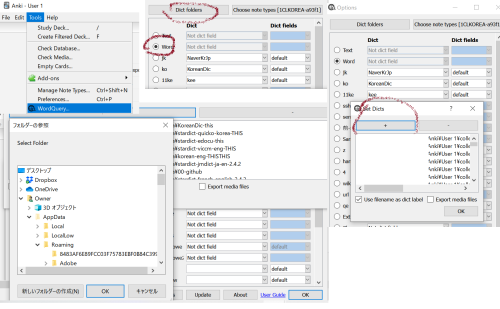
 For Korean I use korean-english/ korean-korean and naver korean-japanese dictionary and the hanja dictionary (sometimes it’s helpful or maybe I just do it for the shits and giggles. it generates all the homophones in hanja form! I usually don’t pay attention to this).
For Korean I use korean-english/ korean-korean and naver korean-japanese dictionary and the hanja dictionary (sometimes it’s helpful or maybe I just do it for the shits and giggles. it generates all the homophones in hanja form! I usually don’t pay attention to this).
I also use it in conjunction with readlang and rikaisama (Japanese) since I import cards using those programs/services. Readlang doesn’t know how to unconjugate so you’d have to painstackingly unconjugate the verbs so I only use it on certain cards which I mark via tagging before importing.
HANSEIDO – This gives you korean definitions. I use it to mass generate defintions. I select all the korean cards in browse and generate the definition. again, it does not know how to unconjugate. you can not use it in the EDITING FIELD. It can only be executed in the browse field. I was curious and tested it to see if it would look up hanja since there are lotta of homophones depending on the word and it WORKED!
CLOZE DELETION SHORTCUT PLUGIN called BASIC C1 WRAPPER- I installed other plugins I would never use and replaced the code with the cloze deletion shortcut for c2 and c3 and c4 etc. so for me it’s control + 2, control +3, control + 4 to make the highlighted text clozed. there’s also the space bar one
CLOZE EACH CHARACTER PLUGIN – it’s based off the cloze shortcut plugin which uses control + space bar AS THE shortcut for c1. Therefore, the spacebar cloze plugin stops working if I install cloze each character. So, I chose this over the spacebar plugin!)
as is this (I use the new button/short-cut for clearing all the clozes in the field) and this
PAINT.NET PROGRAM – for cutting out the text from the screenshots. I like this over gimp and MS paint and this other program. I use the shortcut key “s” to select a chunk of the picture so I can cut it and paste it into anki. Also I use the macro mouse for copy pasting (control c, control v). Unlike the other programs, paint.net has shortcuts for accessing a specific picture when you open up multiple pictures. Sometimes I take screenshots and save them to generate cards later and so after I open a handful of pictures I switch between the pictures by using the shortcuts control + 1 for the first pic open, control + 2 for the second pic open, etc etc
EDIT: I now use sharex. check out mattvsjapan’s youtube vid about the program!
 TWEAK ANKI SETTINGS
TWEAK ANKI SETTINGS
This isn’t a plugin or a program but anki is completely different with different settings. I used to be overtested like crazy from the default settings as well as the damn steps. So I don’t feel burdened or ashamed of generating multiple cloze deletion cards simply because my settings are set so I can push easy cards far out rather quickly and cloze deletion cards are easier to remember than regular cards and I did regular cards already and know they don’t work as well. My settings for Japanese are even more lax since I’m that much more confident and comfortable with Japanese. I have different settings for each deck depending my level and the format (THE CLOZE DELETION card format has huge ease intervals etc for obvious reasons!). as you get better at a language at the language you should increase the ease interval/etc.the default settings are just too much. and if you need those default settings to retain a decent percentage than you’re probably better off not using anki and YOU SHOULD instead read and listen consistently to learn/familiarize yourself with the common words/sentence patterns/ etc.
to retain a decent percentage than you’re probably better off not using anki and YOU SHOULD instead read and listen consistently to learn/familiarize yourself with the common words/sentence patterns/ etc.
https://vladsperspective.wordpress.com/2017/03/14/optimize-your-anki-youre-overtesting-yourself-on-too-few-cards-make-huge-gains/
and don’t forget to change the STEPS. I hate steps! My step is just one and it’s usually 2900 minutes. If I fail a card I do not want to see it 1 minute later since it will interrupt the flow of my anki review mojo. I love anki now. But seriously why the hell do people want to see anki cards 1 minute and 10 minutes after failing… that just sounds like torture (It literally ruins anki reviews because I get CONSTANT interruptions not to mention I can’t fathom how anyone can consider 1 minute and 10 minutes intervals to be SPACED. if you need to see it that frequently that maybe you shouldn’t have added that card. I feel more motivated to read my anki card after failing it if anki shows it to me 2 or 3 days from when I initially saw it rather than the next day or 5 minutes later.
When the dictionary and google and naver translate fail me I go to chiebukuro, reddit, korean discord, or korean stack exchange. I prefer chiebukuro solely for the fact that it’s less of a pain in the ass. Also Japanese people are very kind and sometimes Japanese is better than English for the explanation since the 2 languages are grammatically similar but Japanese and Korean are very different languages and some shit is just is hard to translate to Japanese and vice versa. the stack exchange wants me to write a paragraph in the question field or something. it always bitches about how I don’t have enough text. It’s ridiculous.
 So I usually download the episode than watch it on youtube or ondemandkorea etc because it’s so much more convenient with rewinding and fast-wording or even looping. I use kmplayer because I can set it up so that I can rewind and fastforward by scrolling my mouse and that is very convenient. Also I can press f5 and f6 to set point a and point b respectively so I can loop the video (I don’t use this often). also if I press control + c kmplayer will take a screenshot and put it in my clipboard which I can paste into paint/gimp/etc. KMPLAYER takes the screenshot of the video at full screen which makes the text BIGGER so it’s really convenient since korean shows are notorious for having small text. Meanwhile Japanese shows have HUGE text literally covering 20 % of the screen as you can see all over this post which I like for practical reasons ie reading/putting it into anki though sometimes I wish it were a little smaller but it’s still better than Korean TV text. I always gotta make the Japanese video smaller before taking a screenshot to add to anki while for Korean it’s ALWAYS fullscreen just to get that tiny text as big as possible.
So I usually download the episode than watch it on youtube or ondemandkorea etc because it’s so much more convenient with rewinding and fast-wording or even looping. I use kmplayer because I can set it up so that I can rewind and fastforward by scrolling my mouse and that is very convenient. Also I can press f5 and f6 to set point a and point b respectively so I can loop the video (I don’t use this often). also if I press control + c kmplayer will take a screenshot and put it in my clipboard which I can paste into paint/gimp/etc. KMPLAYER takes the screenshot of the video at full screen which makes the text BIGGER so it’s really convenient since korean shows are notorious for having small text. Meanwhile Japanese shows have HUGE text literally covering 20 % of the screen as you can see all over this post which I like for practical reasons ie reading/putting it into anki though sometimes I wish it were a little smaller but it’s still better than Korean TV text. I always gotta make the Japanese video smaller before taking a screenshot to add to anki while for Korean it’s ALWAYS fullscreen just to get that tiny text as big as possible.
So when i come across something that I want to add to anki I…
1) press control + c on kmplayer. I either let the video play ( I can rewind if I want to etc) or loop it at a specified scene.
2) paste in paint
3) search lingoes
4) run word query with control + enter (right enter). I set it up so that the word-query dictionary fields do not show up during reviews. they take up a lot of space so I just copy whatever I want into the cloze field.
5) if that doesn’t work I go to google or whatever. Or I could add a tag to it to go back to fill the definition in later so I can just keep watching the episode. sometimes I have to ask on chiebukuro or korean stack exchange and the responses can take days sometimes.
6) I cut out a square or rectangle that contains the text and paste into the screenshot field of my anki card. I set this to show up in the BACK. Sometimes I find the scene itself ( without the text) helpful to remember so i’ll include it on top of the text.
7) if I find something in lingoes with an example sentence I paste the definition, example sentence, japanese translation all on the same field. then I use the shortcut for cloze deleting and cloze delete each syllable of the word (usually 2), and a part of the definition (a syllable or two). I try not to make too many cloze deletion cards. I usually generate 2 cloze deletion cards since first card is for the syllable of the word & syllable(s) of the defintion and second card is for the second syllable. I cloze the definition under the cloze of the syllable that’s EASIER to remember. If the word is particularly hard I will make 2 clozes with 2 syllables of the word and a 3rd cloze with only parts of the definition clozed out ( I rarely do this one because I don’t like making 3 cards for a word unless the word is particularly tricky or challenging). it all depends on how I perceive the difficulty of the word in terms of remembering it.
I repeat the steps if the word has another meaning (which was not used in the talk/variety show) that I think is easy to remember/ it seems worth remembering. kill 2 birds with one stone.
b) if lingoes doesn’t find anything but word query dictionary finds something then I use that. If i don’t have the sentence I just use word and definition with stuff clozed out.
** when I initially discovered the wonder of cloze deletion I was between a rock and a hard place because cloze-deleting a screenshot of a tv show is time-consuming (compared to clozing text with the ms paint and copy-pasting. i sure as hell won’t type out the sentence) but effective since the screenshot is memorable and I actually get something out of my anki review since something is blanked out. Inserting a screenshot that contains text without blanking anything out does nothing for me for korean. I realized one day that I can cloze the definition entry and put the screenshot on the back as a reminder/test as to why I care about the word. That’s why I love clozing the example sentences in lingoes. I feel more motivated to read the sentence or phrase in the screenshot knowing that I read the definition or explanation just a few seconds ago.
8) as I’m adding my cloze deletion cards I also add the word by itself to another field so I can look up all the crap on hanseido later on. I put the hanseido definition on the front since it’s a different definition than the one I grabbed from the other dictionaries and I’m more likely to read it if it’s on the front of the card. no scratch that; i will not read it if it’s on the back. it’s some psychological/conditioning thing! I’m very impulsive with the pressing.
9) after I’m done adding for the day I run hanseido in browse
 10 ) be amazed by the number of cards I Made (remember one word could have 2 or 3 cards) in one day and actually remember shit! If you want to know how many NOTES you have rather than number of cards, type Card:1 in your card browser after selecting the deck.
10 ) be amazed by the number of cards I Made (remember one word could have 2 or 3 cards) in one day and actually remember shit! If you want to know how many NOTES you have rather than number of cards, type Card:1 in your card browser after selecting the deck.
Anyway, going back to the initial example I gave courtesy of some episode of HIGH SCHOOL RAPPER. I know that if I did the traditional format of pasting the screenshot let’s say on the front and the answer on the back I may not remember the word or the meaning despite countless reviews on anki. For example what I get out of the anki reviews could be that it’s a 2 syllable word i failed a bunch of times, or a 2 syllable word that starts a with a gg sound, or I’ll remember the definition but not the word itself ( so I may not recognize thy the word when I see it in the wild) , or I’ll remember. the word but not remember the meaning ( or assign the meaning to that word). There’s too much going on in those 2 syllables to just make ONE CARD. There are double consonants, one syllable has bacchim, the other syllable doesn’t, i gotta remember which syllable has the bacchim and which doesn’t, i gotta remember the hangeul that makes up the bacchim, definition is not as simple and straightforward as concrete nouns like pig etc (I think ggaddak is an adjective? korean grammar is confusin’). I gotta break it down to get something out of it and I wish I figured that out sooner.

=====

===

=====

===

BACK:
 <- I actually already had this word in my deck from months or years back.
<- I actually already had this word in my deck from months or years back.
I found it!
So it was set up as
Front:
이도 저도
Back:

I linked the youtube link for the sake of satisfying anyone’s curiosity but i did not add any linkst o the anki card and I almost always never bother to add links to anki cards especially youtube vids since those links die. omg holy shit the vid has KOREAN SOFTSUBS now…. those definitely didn’t exist in 2012. the vid has subs in like 12 diff languages.
So when I initially looked up the word the meaning of the word, the meaning was crystal clear since I looked up the word while watching Strong Heart in 2012 or 2013?? I definitely remembered the meaning and the definition for at least 30 minutes in my head due to short-term memory since I heard it/read it/looked up the definition, it made COMPLETE sense, and it was used in a funny way in native speech. I added it to anki and reviews for this word went swimmingly for a while but eventually I completely forgot the meaning of the word and the word probably a few months or a year later. It was on the default, overkill anki settings with the steps and everything so it’s obvious it’s the card format that’s sucking not to mention the default steps are soul-sucking and just completely unnecessary for cards you make yourself. At that point I entered the cycle of learning and remembering and forgetting the word and the meaning and I’m sure half the time I was half-assing my reviews which includes not even reading the back of the card (like I said impulsively press enter or spacebar after 0.5 seconds). Passively reading stuff doesn’t do shit in this particular case. active recall is what counts! I ended up never regaining the initial crystal clear comprehension and familiarity with the word and the meaning that I possessed when I first looked it up. Actually maybe I did regain that level of clarity to some extent transiently when I would read the card in its entirety but that memory never lasted a significant amount of time because I am not practicing active recall with this very common anki format. It’s a lot of wasted time and effort. You’d think the active recall is more demanding and difficult and time-consuming but the passsive-reading is more demanding, difficult and time-consuming since it does not work. you gotta look at the FOREST NOT THE DAMN TREES!! It seems like a simple enough task to extend my memory of this word/phrase and its meaning that I learned almost effortlessly by encountering it in a memorable context but in hindsight it’s clear that this anki format is terrible for that. I’m sure if I added the card in the multiple cloze deletion format I would’ve remembered/learned this word and its meaning first and foremost and with less time and effort and I most certainly wouldn’t have looked it up while watching PRODUCE 48! I’m not implying that if I added the card in 2012 in multiple cloze format then never saw it outside my deck that I should know it in 2019. What I think happened was that I encountered the phrase HOWEVER many times after adding it to anki in 2012/2013 and probably looked it up again even though it’s in my anki deck since the anki reviews weren’t effective then decided to not add it again since it’s already in anki. I am aware that I left out “anida” in the front and I’m not surprised I did that since as I mentioned before I half-assed anking when it came to Korean. I did anything and everything possible to cut corners to minimize time I spend making cards in anki because time = money. I don’t think the presence of “anida” on the front of the card would’ve made a big difference in the end result x months/years later since the anki format is inherently lacking. ido-juhdo is the meat of the phrase anyway! I was dead-set on half-assing anking as much as possible for Korean whether it’s making cards or doin reviews because I knew that anki does work and it’s helpful but I knew deep inside that the card format was inherently lacking. I eventually figured out the better format and the reasons why it’s superior in every way.
I added this word AGAIN in 2019 while watching Produce 48 either knowing that I already have it in my deck (it’s easier to make a card than to search, find, and edit a card or suspend a card) or while not even being aware. I knew it wasn’t my first time encountering this word or looking up the definition but I also knew that I was looking it up now since I had no idea what the hell it meant. In this clozed format I learned the word and its meaning easily (THERE’S NO BACCHIM OR DOUBLE CONSONANTS ETC and the context is memorable) and I kept hitting easy and that enabled me to could focus my energy on other cards that are harder. I have come across Korean words in Korean tv shows (2012 to now) that are used in fun and memorable ways but because I didn’t add it in the clozed format, I missed out on learning the words!!! Trying to learn the word (remembering Korean words is not the same thing as remembering Japanese words or English words or Spanish words etc etc. It’s demanding in its own way ), the meaning, the usage (Korean grammar/conjugation/etc is no damn joke. I nodded when I read someone say it’s Japanese grammar times ten. it’s not an exaggeration actually), etc all at the same time is not following the principle of KEEP IT SHORT AND SIMPLE.
one thing I can say for sure as someone who learned languages using anki and native material, sentence cards work better with Japanese than korean since it can be quite the shitshow for korean. The reason for that is the difference in the writing systems which I kinda wrote about in the hanjaro post.

 I think reading is effective for learning your target language only if you find a way to make it more comprehensible. You still get benefit from reading a lot while looking up nothing but the benefit is so minuscule compared to reading something on the kindle where you can look up stuff instantaneously with very little effort due to its amazing pop-up dictionary ( You can even generate anki cards from the dictionary look ups via anki plugins). I have been looking into how to read a korean ebook (without drm) with dictionary look-up on an ereader this past week because I really hate how I can’t look up anything on the kindle. Your only option for learning Korean on the kindle is to highlight all the sentences you want to look up later as you read. I thought if insert hanja into the text via hanjaro that that would be enough to make reading in Korean on the kindle more conducive to learning but it’s not enough. Usually I more often don’t know korean-korean words as opposed to sino-words when I read Korean since I use hanjaro (and most or half the time it’s correct or at least helpful). What I especially love about the kindle is that I have no desire to add words to anki when I read stuff on it. The reason is that my interest in the word in question is at its peak the moment read it in the compelling book while possessing the knowledge of the full context. So when I look up the word on the kindle my curiosity is usually completely satisfied and I understand the sentence much better than before I looked it up ( don’t know about you but I usually suck at guessing/inferencing from the meaning of an unknown word based on text) and I could care less whether or not I’ll remember the meaning of the word or the word itself 30 minutes from that moment (Also I never understood the appeal of language notebooks where you copy the dictionary/example sentence etc in a notebook when you look-up words while reading… sounds time-consuming and ineffective to me). I sometimes highlight sentences and stuff if there are stuff I want to look up that I can’t look up or find in the kindle
I think reading is effective for learning your target language only if you find a way to make it more comprehensible. You still get benefit from reading a lot while looking up nothing but the benefit is so minuscule compared to reading something on the kindle where you can look up stuff instantaneously with very little effort due to its amazing pop-up dictionary ( You can even generate anki cards from the dictionary look ups via anki plugins). I have been looking into how to read a korean ebook (without drm) with dictionary look-up on an ereader this past week because I really hate how I can’t look up anything on the kindle. Your only option for learning Korean on the kindle is to highlight all the sentences you want to look up later as you read. I thought if insert hanja into the text via hanjaro that that would be enough to make reading in Korean on the kindle more conducive to learning but it’s not enough. Usually I more often don’t know korean-korean words as opposed to sino-words when I read Korean since I use hanjaro (and most or half the time it’s correct or at least helpful). What I especially love about the kindle is that I have no desire to add words to anki when I read stuff on it. The reason is that my interest in the word in question is at its peak the moment read it in the compelling book while possessing the knowledge of the full context. So when I look up the word on the kindle my curiosity is usually completely satisfied and I understand the sentence much better than before I looked it up ( don’t know about you but I usually suck at guessing/inferencing from the meaning of an unknown word based on text) and I could care less whether or not I’ll remember the meaning of the word or the word itself 30 minutes from that moment (Also I never understood the appeal of language notebooks where you copy the dictionary/example sentence etc in a notebook when you look-up words while reading… sounds time-consuming and ineffective to me). I sometimes highlight sentences and stuff if there are stuff I want to look up that I can’t look up or find in the kindle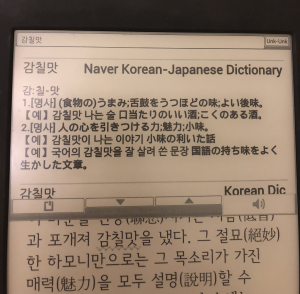 dictionary. Also FYI Hanjaro is conducive to look ups because it separates the word from the particle etc with the parentheses so all I have to do is long-press rather than long-press and drag to only select the word.
dictionary. Also FYI Hanjaro is conducive to look ups because it separates the word from the particle etc with the parentheses so all I have to do is long-press rather than long-press and drag to only select the word. 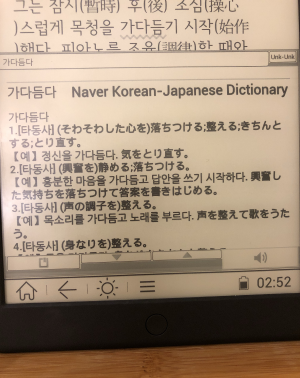 <— The brown thing at the bottom is a woodenbookholder I got off amazon. I highly recommend GETTING one if you read books.
<— The brown thing at the bottom is a woodenbookholder I got off amazon. I highly recommend GETTING one if you read books.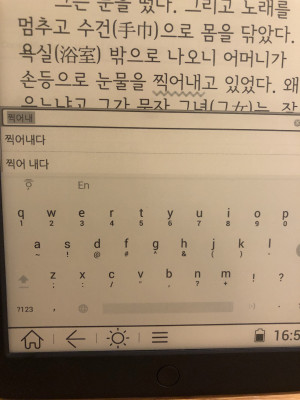 ne/tablet you can configure it so the word is looked up on naver so you don’t have to do any deconjugating. As for the exact match, I sometimes have to erase letters just so the goldendict dictionary suggests “are you looking for this word?” in the dictionary window and then I click on the word in question. Other times I partially select the word before hitting dictionary look-up so that goldendict can suggest the word once the dictionary window opens. For example for 가다듬기 I selected 가다듬 then clicked dic to bring the dictionary up, then tapped on the search bar, at that point goldendict gives me suggestions such as 가다듬다 which I click on. For stuff like 서려서, I would either highlight the whole sentence to look up later or type 서리다 in the dictionary window ( only problem is I risk the chance of wasting my time if the word is in none of the dictionaries anyway. For some reason goldendict adds a space at the end of the word but it doesn’t affect the search results so I don’t bother erasing it and just type whatever I need to type to bring up the results ) . Also if the dictionary entry defines the word as a stronger/weaker version of x I can long press on x, copy it, then paste it in the search bar. Combining hanjaro with this pop-up dictionary makes reading in Korean so much more fun (since obviously it’s more fun when you understand what you’re reading. I think the most important words that i don’t know that i come across are nouns because if you know what “that” is you’re fucked and the dictionaries are really good for nouns which aren’t conjugated ), less burdensome, less exhausting, conducive to learning, and I feel no pressure to make up anki cards for words I look up.
ne/tablet you can configure it so the word is looked up on naver so you don’t have to do any deconjugating. As for the exact match, I sometimes have to erase letters just so the goldendict dictionary suggests “are you looking for this word?” in the dictionary window and then I click on the word in question. Other times I partially select the word before hitting dictionary look-up so that goldendict can suggest the word once the dictionary window opens. For example for 가다듬기 I selected 가다듬 then clicked dic to bring the dictionary up, then tapped on the search bar, at that point goldendict gives me suggestions such as 가다듬다 which I click on. For stuff like 서려서, I would either highlight the whole sentence to look up later or type 서리다 in the dictionary window ( only problem is I risk the chance of wasting my time if the word is in none of the dictionaries anyway. For some reason goldendict adds a space at the end of the word but it doesn’t affect the search results so I don’t bother erasing it and just type whatever I need to type to bring up the results ) . Also if the dictionary entry defines the word as a stronger/weaker version of x I can long press on x, copy it, then paste it in the search bar. Combining hanjaro with this pop-up dictionary makes reading in Korean so much more fun (since obviously it’s more fun when you understand what you’re reading. I think the most important words that i don’t know that i come across are nouns because if you know what “that” is you’re fucked and the dictionaries are really good for nouns which aren’t conjugated ), less burdensome, less exhausting, conducive to learning, and I feel no pressure to make up anki cards for words I look up. I like reading korean with hanja inserted as I explained in my love letter to hanjaro! Moonreader has other dictionary options like google translate and some other web translations but I never use them. I am kinda frugal so that part of me likes how this method does not require Wi-fi. One of
I like reading korean with hanja inserted as I explained in my love letter to hanjaro! Moonreader has other dictionary options like google translate and some other web translations but I never use them. I am kinda frugal so that part of me likes how this method does not require Wi-fi. One of the advantages of an ereader versus the smartphone/tablet IS the battery life… Though this isn’t as convenient and ideal as clicking on a word to have it looked up on naver dictionary automatically unconjugated, it’s still incredibly helpful and convenient for me at my current korean level since I’m not a beginner. I can imagine that this ereader reading method may not have much appeal to someone who has to look up 10-20 words a page. Though I would recommend such a person to do something else and go back to novels later since it sounds like the book is too hard or their Korean would be better improved through other activities.
the advantages of an ereader versus the smartphone/tablet IS the battery life… Though this isn’t as convenient and ideal as clicking on a word to have it looked up on naver dictionary automatically unconjugated, it’s still incredibly helpful and convenient for me at my current korean level since I’m not a beginner. I can imagine that this ereader reading method may not have much appeal to someone who has to look up 10-20 words a page. Though I would recommend such a person to do something else and go back to novels later since it sounds like the book is too hard or their Korean would be better improved through other activities.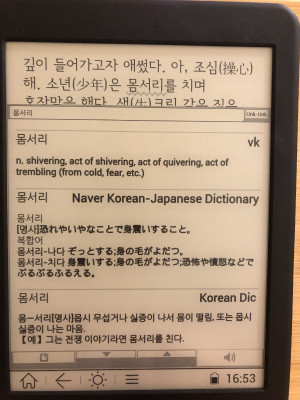 it has less entries than naver korean-japanese dictionaries so I’m not sure how helpful it’d be. After all the whole point of reading novels is so you can come across words you don’t necessarily hear/read everyday.
it has less entries than naver korean-japanese dictionaries so I’m not sure how helpful it’d be. After all the whole point of reading novels is so you can come across words you don’t necessarily hear/read everyday. ous on the UnGungseo font but for some reason the letters are spaced way too far apart so I can’t tell where the spaces between the words are since it looks like there’s a space between every syllable block. Unfortunately I couldn’t find a Korean font where the hanja looks gorgeous the way it does on ungunseo so I settled on 서울 font and 한겨레. I have a distinct disdain for straight Korean fonts which make me that much less motivated to read Korean and increase my anxiety. I must say that using a font I love in the ereader makes me that much more excited to read Korean but I’m sure the novelty will wear off .
ous on the UnGungseo font but for some reason the letters are spaced way too far apart so I can’t tell where the spaces between the words are since it looks like there’s a space between every syllable block. Unfortunately I couldn’t find a Korean font where the hanja looks gorgeous the way it does on ungunseo so I settled on 서울 font and 한겨레. I have a distinct disdain for straight Korean fonts which make me that much less motivated to read Korean and increase my anxiety. I must say that using a font I love in the ereader makes me that much more excited to read Korean but I’m sure the novelty will wear off .
 <_-__–_
<_-__–_
 <-FOR THIS particular word the corresponding meaning was not listed under the k-e english dictionary lol. It was however listed in the K-J naver dic for lingoes which I reached after scrollling.
<-FOR THIS particular word the corresponding meaning was not listed under the k-e english dictionary lol. It was however listed in the K-J naver dic for lingoes which I reached after scrollling.


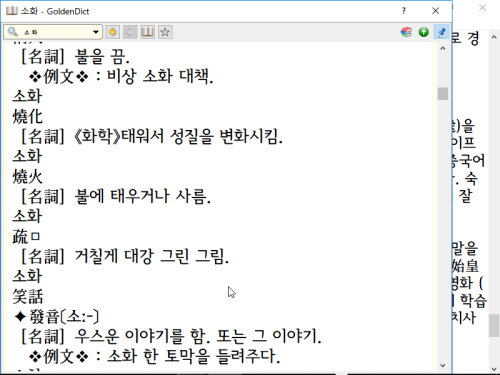 <- goldendict woes and joy
<- goldendict woes and joy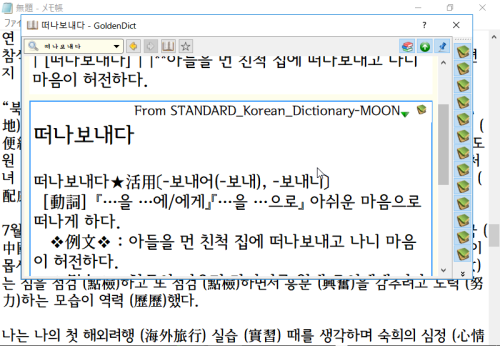


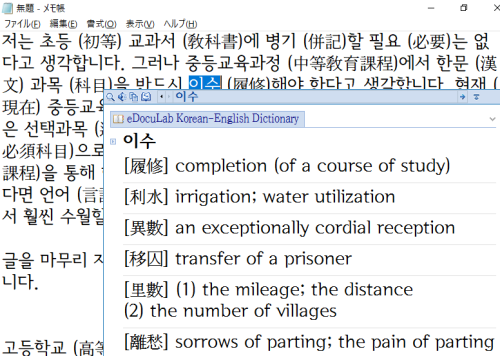


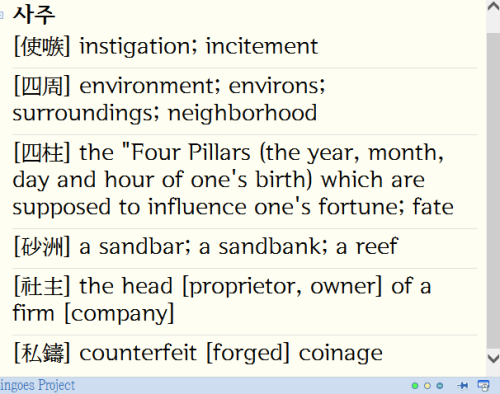





















 #2 https://postimg.cc/RNLz3WmF
#2 https://postimg.cc/RNLz3WmF




















